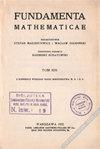Cantor动力学和简单局部有限群中的强轨道等价
IF 0.5
3区 数学
Q3 MATHEMATICS
引用次数: 1
摘要
本文给出了Giordano、Putnam和Skau的一个结果的动力初等证明,该结果建立了Cantor空间的两个极小同胚为强轨道等价的充要条件。我们的论点是基于对一些附属于极小同胚的可数局部有限群的详细研究。该方法还使我们能够证明简单局部有限群上同构关系的Borel复杂性是由Borel S∞作用引起的普遍关系。本文章由计算机程序翻译,如有差异,请以英文原文为准。
Strong orbit equivalence in Cantor dynamics and simple locally finite groups
In this article, we give a dynamical and elementary proof of a result of Giordano, Putnam and Skau which establishes a necessary and sufficient condition for two minimal homeomorphisms of a Cantor space to be strong orbit equivalent. Our argument is based on a detailed study of some countable locally finite groups attached to minimal homeomorphisms. This approach also enables us to prove that the Borel complexity of the isomorphism relation on simple locally finite groups is a universal relation arising from a Borel S∞-action.
求助全文
通过发布文献求助,成功后即可免费获取论文全文。
去求助
来源期刊

Fundamenta Mathematicae
数学-数学
CiteScore
1.00
自引率
0.00%
发文量
44
审稿时长
6-12 weeks
期刊介绍:
FUNDAMENTA MATHEMATICAE concentrates on papers devoted to
Set Theory,
Mathematical Logic and Foundations of Mathematics,
Topology and its Interactions with Algebra,
Dynamical Systems.
 求助内容:
求助内容: 应助结果提醒方式:
应助结果提醒方式:


